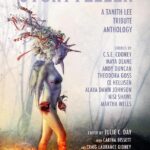
Genres: Queer Protagonists, Sci Fi
Representation: Asian-coded setting and cast, achillean MC, M/M
PoV: Third-person present tense, second-person present tense
Published on: 27th June 2023
ISBN: B0B9KV5G7Z
Goodreads

War machines and AI gods run amok in The Archive Undying, national bestseller Emma Mieko Candon's bold entry into the world of mecha fiction.
WHEN AN AI DIES, ITS CITY DIES WITH IT
WHEN A CITY FALLS, IT LEAVES A CORPSE BEHIND
WHEN THAT CORPSE RUNS OFF, ONLY DEVOTION CAN BRING IT BACKWhen the robotic god of Khuon Mo went mad, it destroyed everything it touched. It killed its priests, its city, and all its wondrous works. But in its final death throes, the god brought one thing back to life: its favorite child, Sunai. For the seventeen years since, Sunai has walked the land like a ghost, unable to die, unable to age, and unable to forget the horrors he's seen. He's run as far as he can from the wreckage of his faith, drowning himself in drink, drugs, and men. But when Sunai wakes up in the bed of the one man he never should have slept with, he finds himself on a path straight back into the world of gods and machines.
The Archive Undying is the first volume of Emma Mieko Candon's Downworld Sequence, a sci-fi series where AI deities and brutal police states clash, wielding giant robots steered by pilot-priests with corrupted bodies.
Come get in the robot.
I received this book for free from the publisher via NetGalley in exchange for an honest review. This does not affect my opinion of the book or the content of my review.
Highlights
~prepare to be confused
~but in the best way
~relatable!MC is way too relatable
~really not your typical mecha story
~just get ‘wtf Sunai?!’ tattooed, it’ll be faster
Sometimes, a book is a total mindfuck. And sometimes, that is very much okay.
*
What you need to understand is: I have no fucking clue what just happened. I mean, I do, kind of. Superficially.
But deep down, in my heart of hearts, I know the truth: I have no fucking clue what just happened.
And it is AWESOME.
Hope is not an act for which the universe is beholden to reward you.
The Archive Undying isn’t what I call an LSD book, where the speculative elements are wacky as fuck and everything seems so random and also there are a lot of colours. I could sit down and explain the world of this book to you just fine, and it would make sense. It’s perfectly coherent. It’s not even hard to believe in – I was never sure if this story is set in another world, or our world’s future, because I don’t have to stretch my suspension of disbelief very much to buy that this could be us in a few hundred years or so. Nor is there any issue with Candon’s prose; her writing is graceful and sharp, and when she puts words together they make sense! They have meaning! They convey information that you can process and comprehend!
And yet…when you finish reading this book, and put it down, I can very nearly guarantee you will have no idea what just happened.
Both their brains are riddled with scars earned by enduring the faithless whim of the universe, hopped up on their ill-advised impulse to survive.
But! But. This is important. The Archive Undying is not confusing because it’s bad. I think most readers have, at some point, run into that kind of book; one that is messy, stopping-and-starting, all over the place, like the author was on drugs while writing it.
The Archive Undying feels instead like a book where the author is in complete control, knows exactly what is going on, is deftly keeping all the balls in the air – but I’m the one on drugs.
After literal months of brainstorming, that is the best way I have come up with to describe the sensation to you, dear reader. Because the whole way through this book, the sense that it all fits together comes through loud and clear. I am unshakeably certain that Candon knows exactly how this world works down to the smallest detail; that she understands, absolutely, the dynamics and histories between the various factions, cities, AIs, rebel groups, et al; that you could throw any fanfic-esque scenario you like at her, and she wouldn’t hesitate a beat before being able to tell you how any one of her characters would react to it, how they would act within it. She knows her story and the world it’s set in and the characters running around in it inside-out-and-backwards.
But we don’t.
It’s not that we’re being shown a very narrow piece of Sunai’s world; we actually see, if not a geographically huge slice, certainly one that cuts across many different classes, power structures, and other anthropological strata. No, we’re given all the pieces we could possibly need to put the puzzle box together…except the character motivations.
I don’t mean that the characters are not motivated. They absolutely are. But Candon draws a veil between the reader and the inner workings of her cast; she’s blown up the bridge that connects us and them, and because we can’t see inside the minds of the characters it feels so much more like we’re observing real people in the real world doing real things. It allows for mystery on a scale that most books are not capable of, gives room for more twists and reveals than could be packed into a story where we know the characters’ minds. The cast of Archive Undying can – and very much do – take us by surprise in a way they simply couldn’t if we could see inside their heads the way we’re used to doing. We’re not blind, exactly – it’s not that we get none of our main character’s thoughts – we’ve just not been given the advantage we’ve taken for granted so long we didn’t realise it was an advantage until it was gone.
We’re left, instead, to know these characters by what they do rather than what they think; and there’s something pretty powerful in that. In the real world, it’s only by what you do that you can be known; it is only what you do that matters, in the end, not what you think or feel. And so choosing to tell a story this way feels deliberate, feels pointed, feels like Candon is making a point. Maybe it’s something about how we treat characters so very differently from real people, because we understand and sympathise with them in a way we don’t – and can’t – with real people; maybe it’s about how wildly our self-image can conflict with how other people see us, with what we look like to the world instead of what we look like in the mirror. (A mirror is not perfectly accurate, after all; it shows us inverted, and according to some sources, not at our true size.) Maybe it’s about how little motivations matter, when push comes to shove; it doesn’t matter why you do a thing, only what you do and what effect that has. If I say something that hurts someone, the fact that I didn’t mean to hurt them is irrelevant; it certainly doesn’t undo the hurt. If I give a million dollars to charity because I want to look like a good person, my selfish motivation has no bearing on the good that comes from the act. I’m not willing to say motivations are meaningless, but…
Maybe it’s about making us question what the reality of a person is, making us think about how we form our understanding of others, making us ask how we know anybody at all and how accurate can that knowing ever be.
Selfishness is the worthiest trait of living creatures, for it preserves and nurtures you. You, I think, could do with more of it.
There’s definitely a dissonance between what Sunai, our main character, thinks of himself, versus how he appears to others around him, and to us. Sunai thinks he’s a coward, but his actions speak very differently; he thinks he’s worthless, but the events of the book show us someone not just sympathetic but actively wonderful. And we have to depend on what he does, not what he thinks, not just because Candon hides most of his motivation from us but because most of what we see of Sunai comes to us from others. A big chunk of Archive Undying is the second-person narration of something-like-an-AI which gets inside Sunai early in the book, and talks to him. Its reflections on him are our clearest window into him – but how trustworthy is that view? Not just in the sense of, how well can an AI and flesh-and-blood mortal ever really know each other, comprehend each other, make sense to each other, but: can we trust this thing? Is it telling us the truth? Is it fucking with Sunai, or genuinely out to help him?
Sometimes you don’t get to go back to being who you were. Sometimes, the changes kill you.
The cumulative effect of all this? I think it’s very appropriate to have a quote from Tamsyn Muir on the cover, because her Locked Tomb series make for a good comparison here. No, Archive Undying is not about necromancers in space, or swords, or Very Sapphic Girls with a Very Complicated Dynamic. But the wtf-ery you get with Locked Tomb is the closest I can think of to that of Archive Undying.
Let me put it this way: if you found the Locked Tomb books annoyingly confusing? Archive Undying is probably not for you.
Alternatively, if you, like most of us, enjoyed the wtf-ery (not necessarily understood it all – I know I didn’t – but enjoyed it) of the Locked Tomb, then please hop aboard, because I think you’ll be quite at home here.
“We talked about you getting shanked, I know we did. This is shank-worthy behavior, Adi.
The blurb tells you about all that you can be told about this book without getting into spoilers, so I’m not going to talk about the story so much. There is one, and it isn’t so baroquely convoluted that you can’t follow it – I could explain it to you in maybe a mid-sized paragraph. Not so bad! But I think it would be better for each reader to uncover it on their own, so instead I want to give you a quick rundown on why you are likely to love this, to try (probably fruitlessly) to explain what this book feels like.
Because gods, it is so full of emotion. The Archive Undying drips emotion, bleeds it, and there is no way to turn these razor-sharp pages without your bleeding for them too. Expect your heart to be lacerated with Feels and stitched back together with impossible giggles; brace yourself to lose your breath, and to find it again when you gasp with awe; be ready for a book that will hurt you, and make you so, so glad that it did.
You mustn’t ever say ‘yes’ to a god, even a little one. That’s how they become what they are. They will hate your ‘no’, and will strive to refuse it, for a god is only a god when it is absolute. Your ‘no’ unmakes them. That is why you must resist, Sunai. If divinity relies on our obedience, we survive only when we defy it.
It really will hurt. Because this is also horror, is the thing. Not capital-h Horror, not genre horror, but fucked-up and horrifying. God-level trauma, literally. And it’s the kind of beautiful horror that I find so much more terrifying than the ugly, gory kind. It’s all desperation and doing terrible things for maybe-good reasons, vicious intrigue and Look At The Bigger Picture (and ignore how it crushes those of us in the Little Picture). It’s about running as fast and as far as you can and still ending up with your leg caught in the trap. It’s about screaming that you’re you and you want to stay that way and fuck anyone who doesn’t like it.
Now their consent is asked for, because at last it is required.
But it’s not only horrifying. It would be easier, if it were; it would be an easier book to categorise, easier to make sense of, elicit less complicated feelings if it was just and only horrifying. But it’s not. It’s a mystery and an epic and a glimpse of a maybe-future, a world sideways-on to ours (mirroring us). It’s an escape and a thrill and a dream, sends shivers down your spine and runs in a loop over and over in your head, a puzzle box you can’t stop trying to solve because it’s so wonderful you have to see it whole, you have to make sense of it, it’s a compulsion.
All of which grabs you by the throat not just because of Candon’s amazing writing, but because she’s given us a main character who pickpockets our hearts before we realise we should be guarding them. Sunai is a sweetheart and a disaster!queer, one parts flirting to three parts trauma but totally able to handle himself (more or less) right up until someone expresses any kind of positive emotion towards him, at which point he dissolves into a mess – making him far too relatable to my entire social circle.
Sunai must, with great urgency, attend to absolutely anything except this tender regard.
And yet this is more than a little bit of a (very queer) love story, which means Sunai has to deal with Feels, and you will want to shake him and be unable to resist laughing at him, and you should definitely be prepared to want to pet him, like the adorable chaos-child that he is. He makes terrible decisions – seems to always find the worst possible option and pick that one – but I defy you not to love and adore and adopt him, nonetheless.
Or maybe because of.
Sunai thinks: Why is Adi so stupid! And: Why does he make me so stupid?
Gods, I am simply not smart enough for this book; I cannot write a review that will really do it justice. The Archive Undying is a labyrinth of pearl and bone and ceramic, smooth and elegant, and full of secrets and monsters, and I need to read it again, and again, and probably at least half a dozen times more after that, to really get it all. There are layers and layers here, in an intricate and kind of terrifying world, with a cast of sharp-edged misfits all walking around like their hearts are grenades with the rings pulled out. This is a book about personhood, and consent, and making stupid decisions because of your feelings; it’s about cooking and AI-gods and how much we value other people’s free will; it is sneaky and hilarious and beautiful and awe-full, a book that confuses you and demands you think.
Veyadi gives him a look of Don’t fucking patronize me, you goddamn clown man
The Archive Undying is a book you have to work at, not an easy read at all, but I have rarely come across one that was so hard but so worth it. I know this is going to be an incredibly polarising book – some readers are going to hate it, and honestly, I pity them. Because they are missing out on a wildly extravagant, astonishingly idiosyncratic, genre-redefining gem, and that is always something to be mourned.
This strange, gorgeous, sci-fi fever dream is out this coming Tuesday. I adore it, and I hope you will too.
You can read the first two chapters online here, or even download the sneak peek for free!







You breakdown of this novel is a HUGE HELP! Now, I have a better understanding of what this book is about! I’ll be reading it very soon, I hope.
I’m so glad it was a help! And I hope you enjoy the book!!!